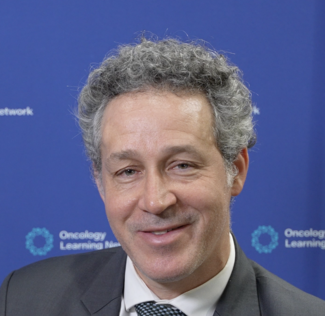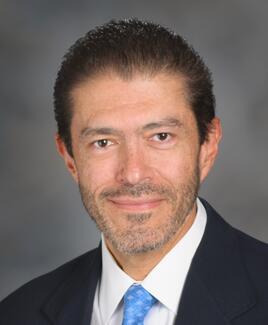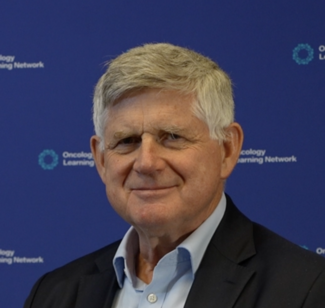ASC2ESCALATE: Asciminib Demonstrates High Molecular Responses Among Patients With CML-CP
David Andorsky, MD, Rocky Mountain Cancer Centers, Boulder, Colorado, discusses the results from the phase 2 ASC2ESCALATE trial which evaluated the efficacy and safety of asciminib therapy among patients with chronic myeloid leukemia in chronic phase (CML-CP) following discontinuation of a tyrosine kinase inhibitor (TKI) due to intolerance.
The results of this analysis demonstrated high molecular responses and manageable safety for patients with CML-CP without T315I mutation as a second-line treatment. Dr Andorsky stated, “What we found was consistent with previous findings for this medication.”
Transcript:
Hello, my name is Dr David Andorsky. I am a medical oncologist and hematologist with the Sarah Cannon Research Institute, and I practice medicine at the Rocky Mountain Cancer Centers in Boulder, Colorado.
I was very proud this ASCO to present data from the ASC2ESCALATE trial, which is a trial looking at asciminib, which is a relatively new tyrosine kinase inhibitor therapy for chronic myeloid leukemia. This is a study that has a frontline cohort and a second-line cohort.
The data we presented here were from the second-line cohort. Patients had received 1 prior therapy for their chronic myeloid leukemia and had stopped their first therapy either due to intolerance or that they weren't hitting their molecular milestones in terms of response. We looked at data from 101 patients that had received at least 1 dose of treatment, and then a subset, 63 patients, were evaluable for efficacy at the 24-week time point.
What we found was consistent with previous findings for this medication. Of the 101 patients, only 4 discontinued for adverse events and most adverse events were grade 1 or 2. It's a very tolerable treatment.
There was a somewhat different mechanism of action compared to the other tyrosine kinase inhibitors like imatinib. Those bind to what's called the ATP binding pocket and asciminib binds to a different location on the molecule and so may have a different side effect profile and may be able to overcome resistance to certain resistance mutations.
At the 24-week time point, we saw that 82.5% of patients had a PCR of less than 1%, and the 44.4% were in a major molecular response. 9.5% of patients had a deep molecular response defined as MR 4 or better.
The other unique aspect of this study was that at various time points, at 24 weeks and 48 weeks, there was the opportunity to escalate the dose if patients weren't hitting their milestones. At the 24-week timeframe, if they had a PCR greater than 1%, the dose went from 80 milligrams daily, which is the standard FDA approved dose, to 200 milligrams daily. Then there was a second time point at the 48-week frame where if they weren't in a major molecular response, they also had a dose escalation. Of the 63 patients that reached the efficacy evaluation at the data cut, we had 7 patients that had dose escalation.
We unfortunately don't have data yet on their outcome whether they achieved their major molecular response or hit their milestones, but hopefully at a future ASCO or future Congress, we will be able to present data on that aspect of the trial as well.
Thank you for your attention.
Source:
Andorsky DJ, Luskin MR, Tantravahi SK, et al. Efficacy and safety of asciminib (ASC) in patients (pts) with chronic-phase chronic myeloid leukemia (CML-CP) after 1 tyrosine kinase inhibitor (TKI): Interim analysis (IA) of the phase 2 ASC2ESCALATE trial. Presented at 2025 ASCO Annual Meeting. May 30-June 3, 2025; Chicago, IL. Abstract 6516.















